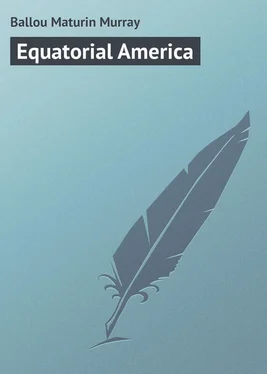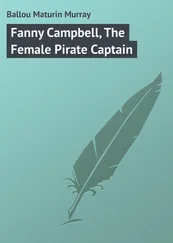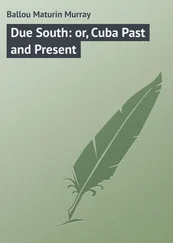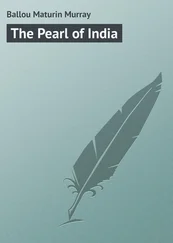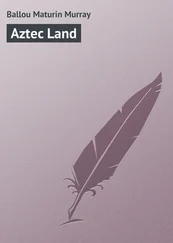Maturin Ballou - Equatorial America
Здесь есть возможность читать онлайн «Maturin Ballou - Equatorial America» — ознакомительный отрывок электронной книги совершенно бесплатно, а после прочтения отрывка купить полную версию. В некоторых случаях можно слушать аудио, скачать через торрент в формате fb2 и присутствует краткое содержание. Жанр: foreign_language, foreign_prose, Путешествия и география, на английском языке. Описание произведения, (предисловие) а так же отзывы посетителей доступны на портале библиотеки ЛибКат.
- Название:Equatorial America
- Автор:
- Жанр:
- Год:неизвестен
- ISBN:нет данных
- Рейтинг книги:4 / 5. Голосов: 1
-
Избранное:Добавить в избранное
- Отзывы:
-
Ваша оценка:
- 80
- 1
- 2
- 3
- 4
- 5
Equatorial America: краткое содержание, описание и аннотация
Предлагаем к чтению аннотацию, описание, краткое содержание или предисловие (зависит от того, что написал сам автор книги «Equatorial America»). Если вы не нашли необходимую информацию о книге — напишите в комментариях, мы постараемся отыскать её.
Equatorial America — читать онлайн ознакомительный отрывок
Ниже представлен текст книги, разбитый по страницам. Система сохранения места последней прочитанной страницы, позволяет с удобством читать онлайн бесплатно книгу «Equatorial America», без необходимости каждый раз заново искать на чём Вы остановились. Поставьте закладку, и сможете в любой момент перейти на страницу, на которой закончили чтение.
Интервал:
Закладка:
Though it has not often been visited by epidemics, Mr. Anthony Trollope pronounces the island, in his usual irresponsible way, to be "one of the hottest and one of the most unhealthy spots among all these hot and unhealthy regions," and adds that he would perhaps be justified in saying "that of all such spots it is the hottest and most unhealthy." This is calculated to give an incorrect idea of St. Thomas. True, it is liable to periods of unhealthiness, when a species of low fever prevails, proving more or less fatal. This is thought to originate from the surface drainage, and the miasma arising from the bay. All the drains of the town flow into the waters of the harbor, which has not sufficient flow of tide to carry seaward the foul matter thus accumulated. The hot sun pouring its heat down upon this tainted water causes a dangerous exhalation. Still, sharks do not seem to be sensitive as to this matter, for they much abound. It is yet to be discovered why these tigers of the sea do not attack the negroes, who fearlessly leap overboard; a white man could not do this with impunity. The Asiatics of the Malacca Straits do not enjoy any such immunity from danger, though they have skins as dark as the divers of St. Thomas. Sharks appear in the West Indies in small schools, or at least there are nearly always two or three together, but in Oriental waters they are only seen singly. Thus a Malay of Singapore, for a compensation, say an English sovereign, will place a long, sharp knife between his teeth and leap naked into the sea to attack a shark. He adroitly dives beneath the creature, and as it turns its body to bring its awkward mouth into use, with his knife the Malay slashes a deep, long opening in its exposed belly, at the same time forcing himself out of the creature's reach. The knife is sure and fatal. After a few moments the huge body of the fish is seen to rise and float lifeless upon the surface of the water.
A large majority of the people are colored, exhibiting some peculiarly interesting types, intermarriage with whites of various nationalities having produced among the descendants of Africans many changes of color and of features. One feels sure that there is also a trace of Carib or Indian blood mingled with the rest, – a trace of the aborigines whom Columbus found here. The outcome is not entirely a race with flat noses and protruding lips; straight Grecian profiles are not uncommon, accompanied by thin nostrils and Anglo-Saxon lips. Faultless teeth, soft blue eyes, and hair nearly straight are sometimes met with among the creoles. As to the style of walking and of carrying the head and body, the common class of women of St. Thomas have arrived at perfection. Some of them are notable examples of unconscious dignity and grace combined. This has been brought about by carrying burdens upon their heads from childhood, without the supporting aid of the hands. Modesty, or rather conventionality, does not require boys or girls under eight years of age to encumber themselves with clothing. The costume of the market women and the lower classes generally is picturesque, composed of a Madras kerchief carefully twisted into a turban of many colors, yellow predominating, a cotton chemise which leaves the neck and shoulders exposed, reaching just below the knees, the legs and feet being bare. The men wear cotton drawers reaching nearly to the knee, the rest of the body being uncovered, except the head, which is usually sheltered under a broad brimmed straw hat, the sides of which are perforated by many ventilating holes. The whites generally, and also the better class of natives, dress very much after the fashion which prevails in North America.
This is the negroes' paradise, but it is a climate in which the white race gradually wanes. The heat of the tropics is modified by the constant and grateful trade winds, a most merciful dispensation, without which the West Indies would be uninhabitable by man. On the hillsides of St. Thomas these winds insure cool nights at least, and a comparatively temperate state of the atmosphere during the day. Vegetation is abundant, the fruit trees are perennial, bearing leaf, blossom, and fruit in profusion, month after month, year after year. Little, if any, cultivation is required. The few sugar plantations which are still carried on yield from three to four successive years without replanting. It is a notable fact that where vegetation is at its best, where the soil is most rank and prolific, where fruits and flowers grow in wild exuberance, elevated humanity thrives the least. The lower the grade of man, the nearer he approximates to the animals, the less civilized he is in mind and body, the better he appears to be adapted to such localities. The birds and the butterflies are in exact harmony with the loveliness of tropical nature, however prolific she may be; the flowers are glorious and beautiful: it is man alone who seems out of place. A great variety of fruits are indigenous here, such as the orange, lime, alligator pear, moss-apple, and mango, but none of them are cultivated to any extent; the people seem to lack the energy requisite to improve the grand possibilities of their fertile soil and prolific climate.
We were reminded by a resident of the town, before we left the harbor of St. Thomas, that the nervous old lady referred to was not entirely without reason for her anxiety. Some of our readers will remember, perhaps, that in October, 1867, a most disastrous hurricane swept over these Virgin Islands, leaving widespread desolation in its track. The shipping which happened to be in the bay of St. Thomas was nearly all destroyed, together with hundreds of lives, while on the land scores of houses and many lives were also sacrificed to the terrible cyclone of that date. Even the thoroughly built iron and stone lighthouse was completely obliterated. There is a theory that such visitations come in this region about once in every twelve or fifteen years, and upon looking up the matter we find them to have occurred, with more or less destructive force, in the years 1793, 1819, 1837, 1867, 1871, and so late as August, 1891. Other hurricanes have passed over these islands during the period covered by these dates, but of a mitigated character. August, September, and October are the months in which the hurricanes are most likely to occur, and all vessels navigating the West Indian seas during these months take extra precautions to secure themselves against accidents from this source. When such visitations happen, the event is sure to develop heroic deeds. In the hurricane of 1867, the captain of a Spanish man-of-war, who was a practical sailor, brought up from boyhood upon the ocean, seeing the oncoming cyclone, and knowing by experience what to expect, ordered the masts of his vessel to be cut away at once, and every portion of exposed top hamper to be cast into the sea. When thus stripped he exposed little but the bare hull of his steamer to the fury of the storm. After the cyclone had passed, it was found that he had not lost a man, and that the steamer's hull, though severely battered, was substantially unharmed. Keeping up all steam during the awful scene, this captain devoted himself and his ship to the saving of human life, promptly taking his vessel wherever he could be of the most service. Hundreds of seamen were saved from death by the coolness and intrepidity of this heroic sailor.
Since these notes were written among the islands, a terrible cyclone has visited them. This was on August 18, last past, and proved more destructive to human life, to marine and other property, than any occurrence of the kind during the last century. At Martinique a sharp shock of earthquake added to the horror of the occasion, the town of Fort de France being very nearly leveled with the ground. Many tall and noble palms, the growth of half a hundred years, were utterly demolished in the twinkling of an eye, and other trees were uprooted by the score.
Читать дальшеИнтервал:
Закладка:
Похожие книги на «Equatorial America»
Представляем Вашему вниманию похожие книги на «Equatorial America» списком для выбора. Мы отобрали схожую по названию и смыслу литературу в надежде предоставить читателям больше вариантов отыскать новые, интересные, ещё непрочитанные произведения.
Обсуждение, отзывы о книге «Equatorial America» и просто собственные мнения читателей. Оставьте ваши комментарии, напишите, что Вы думаете о произведении, его смысле или главных героях. Укажите что конкретно понравилось, а что нет, и почему Вы так считаете.
